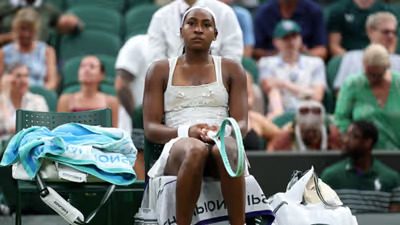
In a stunning turn of events at the 2025 Wimbledon Championships, Coco Gauff, the world No. 2 and recent French Open champion, suffered a devastating first-round exit, falling to Ukraine’s Dayana Yastremska in straight sets, 7-6(3), 6-1. The match, played under the roof on Court No. 1, marked a significant setback for the 21-year-old American, who had been considered a top contender for the title at SW19. This defeat, one of the most surprising of the tournament’s opening days, highlighted Gauff’s ongoing struggles on grass and raised questions about her preparation following a whirlwind post-Roland Garros schedule.
Gauff entered Wimbledon fresh off her second Grand Slam title, having triumphed over Aryna Sabalenka at Roland Garros just three weeks prior. Her powerful baseline game and defensive prowess had propelled her to the pinnacle of the sport, but the transition from clay to grass proved to be a formidable challenge. Grass, with its low bounces and slick surface, demands a different approach—one that rewards aggressive, first-strike tennis and precise serving. For Gauff, whose game relies heavily on topspin and defensive consistency, adapting to these conditions has been a persistent hurdle. “I think it’s just changing my playing style a little bit, which is difficult,” Gauff admitted in a tearful post-match press conference, reflecting on the adjustments needed to succeed on grass.
The match against Yastremska, ranked No. 42 in the world, was a masterclass in seizing opportunity. Yastremska, who had lost all three previous encounters with Gauff, played with fearless aggression, firing 16 winners and capitalizing on Gauff’s uncharacteristic errors. The American struggled with her serve, a known vulnerability, managing only a 45% first-serve rate and committing nine double faults, including two critical ones in the first-set tiebreaker. “I feel like mentally I was a little bit overwhelmed with everything that came after [the French Open],” Gauff confessed. “I didn’t feel like I had enough time to celebrate and also get back into it.” Her schedule, packed with media obligations in New York and a quick trip to Berlin for a grass-court warm-up—where she also lost in the first round—left her little time to acclimate to the surface.
Yastremska, by contrast, was in her element. The Ukrainian, who reached the final of the Nottingham Open earlier in the season, exuded confidence on the grass. “I was really on fire,” she said, her excitement palpable as she celebrated with fans, signing autographs and taking selfies. “This court brings me a lot of nice memories. I played junior finals here, it gave me a lot of emotion. Playing against Coco, it is something special.” Her performance was a testament to her growing comfort on grass, a surface she described as a “friend” this year, and her ability to exploit Gauff’s hesitancy, particularly on the forehand side, where the American’s heavy western grip struggled with the low-bouncing balls.
The upset was part of a broader wave of shocks on day two at Wimbledon, where four of the top five women’s seeds fell early. Third seed Jessica Pegula was dismantled by Italy’s Elisabetta Cocciaretto in just 58 minutes, while fifth seed and Olympic champion Zheng Qinwen succumbed to Katerina Siniakova in three sets. The men’s draw was not immune, with third seed Alexander Zverev and seventh seed Lorenzo Musetti also exiting in the first round. This unprecedented carnage, with 23 seeded players falling in the opening two days, tied a record for the most upsets in a Grand Slam since the current seeding format began in 2001.
Gauff’s defeat marked her second first-round exit at Wimbledon in three years, underscoring her ongoing challenge at the All England Club. Despite her breakout performance there in 2019, when she stunned Venus Williams as a 15-year-old qualifier, Wimbledon remains the only major where she has yet to reach the quarterfinals. “I have faith that if I can make these adjustments, I can do well here. I really do want to do well here,” she said, her determination evident despite the disappointment. The quick turnaround from clay to grass, a transition that has tripped up even legends like Justine Henin and Francesca Schiavone, was a factor Gauff pinpointed as a lesson for the future. “If you go deep in Roland Garros, you’re debating: ‘Do I rush and play that week, or do I take time and play the week before?’ It’s a tricky thing,” she noted.
Looking ahead, Gauff remains optimistic, viewing the loss as an opportunity to reset. “Maybe losing here [in the] first round isn’t the worst thing in the world,” she said, already turning her focus to the upcoming US Open, where she claimed her first major title in 2023. Her resilience, a hallmark of her career, was evident as she praised Yastremska’s performance while vowing to refine her grass-court preparation. “I felt like I wasn’t playing terribly in some points, and she was hitting winners. It’s a combination of everything,” Gauff reflected, showcasing a mature perspective that promises a strong comeback.
For Yastremska, the victory was a career-defining moment, earning her £99,000 and a spot in the second round. As the women’s draw opens up, with top seed Aryna Sabalenka now a clear favorite, the Ukrainian’s fearless play signals her potential to make a deeper run. For Gauff, the heartbreak at Wimbledon is a temporary setback, but one that fuels her drive to conquer the grass courts that first introduced her to the world.
Leave a Reply